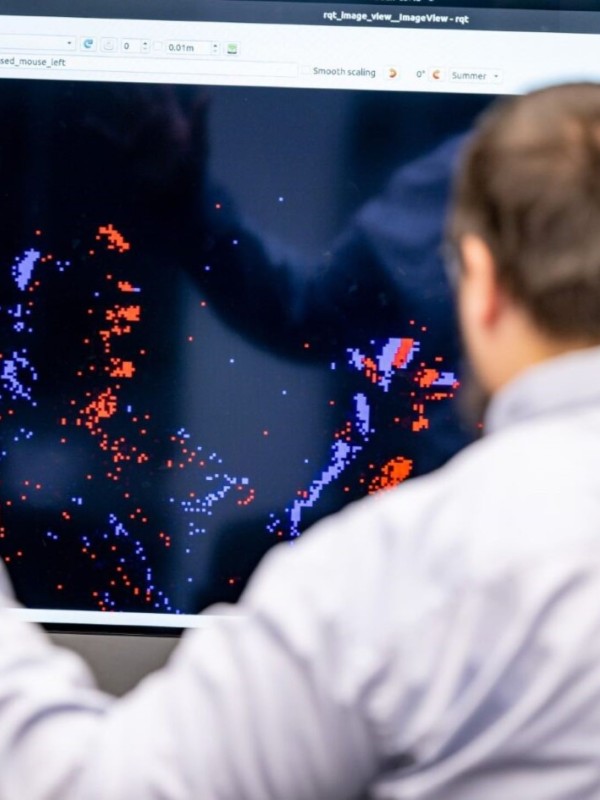
- Applied Quantum Computing
MSc — 2025 entry Applied Quantum Computing
As quantum computing technology advances, the demand for skilled professionals in the field grows. Our Applied Quantum Computing MSc focuses on the practical implementation and application of quantum computing concepts and techniques. It will provide you with the knowledge and skills needed to solve practical problems in industry and research.
Why choose
this course?
Quantum computing has the potential to revolutionise many industries and scientific disciplines. With the UK government pledging to invest £2.5bn in quantum computing over the next 10 years, there will be a demand for people who understand the potential of quantum computing, the problems it can solve and how to solve them.
Our Applied Quantum Computing MSc is designed to train these professionals. The first such course in the UK dedicated to the subject, this is a truly interdisciplinary programme which welcomes not just physicists and computer scientists but graduates from a range of other disciplines such as engineering and economics.
Taught within the School of Mathematics and Physics, the course draws on Surrey’s ground breaking research at the forefront of quantum technologies and will be taught by academics who are leading this field. The University is part of the £6m Quantum Technologies for Fundamental Physics programme.
Statistics
94%
of our physics postgraduate students go on to employment or further study (Graduate Outcomes 2024, HESA).
What you will study
Our MSc in Applied Quantum Computing is designed to enable you to explore the fundamental principles, theories and applications of quantum computing. You will also learn how these will be applied to solve scientific and commercial challenges.
You will spend a significant portion of your time in computer laboratories using packages such as Qiskit, IBM’s open-source software development kit for quantum computers.
In addition to core modules, you will be able to choose from a selection of optional modules such as Advanced Topics in Computer Vision and Deep Learning, and AI and Law – enabling you to tailor your studies to suit your interests and career aspirations. A dissertation project will give you the opportunity to apply your new knowledge and skills to a relevant project which may be undertaken in collaboration with an industry partner.
Application focus
The course is strongly focused on the ‘applied’, highlighting practical applications of quantum computing across fields such as financial portfolio optimisation, drug discovery, energy materials design, nuclear physics and quantum biology. You will learn how quantum computing can solve problems that are important to society by offering unique computational advantages compared with classical computers.
Broad and flexible course
This course is open to graduates from a wide variety of disciplines – not just physicists. It is designed to enable computer scientists, engineers and economists to gain an understanding of the necessary quantum physics concepts.
You’ll study four 15-credit modules per semester on this full-time course.
The dissertation topics you can choose from are usually allocated towards the end of the spring semester. You’ll carry out your work for your dissertation during the summer period.
The structure of our programmes follows clear educational aims that are tailored to each programme. These are all outlined in the programme specifications which include further details such as the learning outcomes:
Modules
Modules listed are indicative, reflecting the information available at the time of publication. Modules are subject to teaching availability, student demand and/or class size caps.
The University operates a credit framework for all taught programmes based on a 15-credit tariff, meaning all modules are comprised of multiples of 15 credits, up to a maximum of 120 credits.
Course options
Year 1
Semester 1
Compulsory
Quantum Computing relies on Quantum Physics, naturally, but you do not need to be fully trained as a physicist to be able to produce a quantum computer program. There are, however, some essential but very un-intuitive concepts that you would not normally have met if you have not already become an expert in quantum physics. This module is designed to give an intensive introduction to those concepts. You will not become an expert in quantum physics, but after this module you will understand how to use it for the purpose of processing quantum information.
View full module detailsQuantum computers are built around a central processing unit which is a physical device operating according to the rules of quantum mechanics. This module teaches the principles of how quantum processors are built and how they function. The module follows the superconducting architecture, which currently has a significant role in the industry and has been widely studied and implemented. The module will start with reviewing the basic physics required to understand superconducting qubits and the theory of superconducting circuits. It will then continue to the operation of such qubits to perform gates, storage, and readout. After studying the basic building blocks and operations, the module will discuss early demonstrations of important algorithms on superconducting processors. These will lead us naturally to the important topics of improving performance through protection of coherence, advanced control, and validation. The last part of the module will focus on state-of-the-art superconducting processors, focusing on the various challenges in scaling up and the strategies that the industry is pursuing to overcome them.
View full module detailsThis module comprises two independent halves, on How to Make a Qubit (Qubits), and on Quantum Optimization (Q Optim). Quantum technologies, including quantum computing, rely on the quantum mechanical principles of superposition and entanglement. Furthermore, this superposition and entanglement needs to be controlled in useful ways. In this module you will learn about what physical systems allow quantum technology production, and their limitations. Quantum computers are only one type of device that uses these principles, and several other technologies are being created that are also enhanced by use of superpositions. Others include atomic clocks and Magnetic Resonance Imaging, MRI. We will also learn about the errors that inevitably build up in quantum computers when quantum superpositions are disturbed, and the strategies that might be built in to correct them. Quantum optimization is expected to take over a large number of demanding computational tasks, because it is capable of performing computations faster than their classical counterparts. Among many potential applications in logistics, aerospace, traffic control and in finance, which includes include pricing, risk management, and portfolio optimizations in financial markets, and indeed some banks have been investing in developing quantum computer algorithms.
View full module detailsThis module comprises two independent halves, on Financial Derivatives, and Topics in Quantum Mechanics. Financial Derivatives. The first half of this module covers various applications of statistical physics to model share prices and financial markets. This mathematics is then applied to calculating prices for some examples of financial derivatives. Quantum Mechanics topics are essential building blocks for our understanding of many physical systems. The module assumes basic knowledge in quantum mechanics from the Introduction to Quantum Computing, but will provide a review at the beginning. Topics include a review of quantum mechanics, operator methods and applications to the harmonic oscillator, spin & angular momentum, symmetries in quantum mechanics.
View full module detailsOptional
This module will introduce students to research techniques that are used in or relevant to quantum computing and quantum technology via extended projects. The four-week projects will cover a variety of relevant topics, many of which are explicitly quantum in nature, and also some that are classical problems that might be sped up with quantum computers. Students will gain technical experience using some combination of state-of-the-art equipment and software, analysing and working with large data sets and in problem solving. This HE7 module provides an opportunity for students to experience an open-ended activity, in which the desired outcomes are not well defined in advance. This project-based work is typically less structured than for earlier levels. Students are expected to take more responsibility for the planning and direction of work than in undergraduate practical activities. The goal is to help prepare students for independent, research or creative development work as part of a team.
View full module detailsThis module introduces the students to the key ethical and regulatory issues associated with artificial intelligence, as well as to the methods of analysis of those issues used in ethics and in law. The focus of the module is on the current state of the art in the applications of artificial intelligence (in particular: of machine learning), with smaller emphasis on hypothetical future developments. The module makes use of the case study method to introduce students to ethical and regulatory (legal) questions through discussion of relevant major incidents from recent years. The module helps students develop their thinking on how to translate abstract ethical (and regulatory) requirements of fairness, explainability or privacy into engineering and business practice.
View full module detailsSemester 2
Compulsory
Quantum Computing relies on Quantum Physics, naturally, but you do not need to be fully trained as a physicist to be able to produce a quantum computer program. There are, however, some essential but very un-intuitive concepts that you would not normally have met if you have not already become an expert in quantum physics. This module is designed to give an intensive introduction to those concepts. You will not become an expert in quantum physics, but after this module you will understand how to use it for the purpose of processing quantum information.
View full module detailsThis module covers circuit-based quantum computers and some of the algorithms that can be implemented using them. The idea of a classical computational algorithm and its complexity is introduced, and used as a language to discuss quantum computational algorithms. Components of quantum circuits are discussed individually, and then built up to show how algorithms such as the quantum Fourier transform and Grover¿s search algorithm can be implemented, and how such algorithms can be used in applications such as factorizing integers using Shor¿s algorithm. A suitable computational frameworkis introduced and used as a tool to implement the algorithms on simulated quantum computers.
View full module detailsAll students aiming for the MSc degree qualification undertake an MSc dissertation project. Students choose a project either from a list of proposed topics within the University, or in some cases arrangement is made for the project to be undertaken in industrial, research or hospital-based environment. The majority of part-time students arrange to undertake the project in their place of work. Students are assigned a supervisor relating to the project chosen. Students undertaking their project outside of the University are assigned both an internal and an external supervisor. The work is assessed as follows: Project write-up A write up of no more than 40 pages in total, including title page, brief abstract, text, diagrams and references must be submitted. Supervisors will give guidance on the layout of the project and the first draft of material where appropriate. When referencing in your written work, you should use the Harvard referencing system unless otherwise directed by the Module Co-ordinator. Further information relating to referencing in your work, can be found on the University Library website at http://www.surrey.ac.uk/library/subject/bibref/
View full module detailsQuantum Mechanics topics are essential building blocks for our understanding of many physical systems. The module assumes basic knowledge in quantum mechanics from modules in earlier years, but will provide a review at the beginning. Topics include a review of quantum mechanics, operator methods and applications to the harmonic oscillator, spin & angular momentum, symmetries in quantum mechanics. The second half of the module then moves beyond isolated quantum systems by addressing the topic of Quantum Entanglement and Quantum Coherence. Here the important concepts of entanglement and decoherence will be studied by developing an understanding of open quantum systems and the density matrix formalism.
View full module detailsThis module comprises two independent halves, on quantum simulations (Q Sim), and quantum biology (Q Bio).Quantum Simulation. The quantum simulation part of this module introduces students to the use of quantum computers in the simulation of physical systems using mapping of Hamiltonians from standard quantum mechanics to a representation suitable for application on quantum computers, along with a study of wavefunction ansatz design, algorithms, and error mitigation and correction.Quantum biology is the study of how quantum mechanical phenomena, such as quantum superposition, tunnelling, and entanglement, can be exploited by living systems to provide evolutionary and/or biological advantages. This half module will cover a range of biological molecules and processes that may exploit quantum effects, such as magnetoreception, photosynthetic light harvesting, and DNA mutations. The goal of this half module is to develop an understanding of how quantum processes could have an impact in nature and how this knowledge can be further used for applications in health and medical sciences. In addition, using research progress in the field of quantum biology and illustrative examples, this course will help to develop an experimental and theoretical understanding of how quantum processes may play a crucial role in maintaining the non-equilibrium state of the biomolecular systems. Many of the subjects acquired through this half module are likely to be of potential use in future project work,
View full module detailsOptional
Module purpose: This course offers an introduction to image processing and computer vision for those interested in the science and technology of machine vision. It provides background and the theory for building artificial systems that manipulate videos and images and alter or analyse their information content. This is done by various computer algorithms that are discussed, implemented and demonstrated.
View full module detailsThis module introduces programming in Python for data science, with a focus on data pre-processing, data mining and analysis, machine learning and deep learning. Besides the practical hands-on experience with writing code, this course also covers the theoretical background on different data analysis techniques and machine learning approaches. The goal is to develop an understanding of how information can be extracted from data and how this information can be further used to make predictions, but importantly how this is done practically in terms of writing clear and transparent source code. Using real-world data sets and illustrative examples, this course will help to develop a theoretical understanding of data science as well as practical experience by developing useful software tools. Many of the techniques acquired through this module are likely to be of potential use in the dissertation project.
View full module detailsOptional modules for Year 1 (full-time) - FHEQ Levels 6 and 7
For further information regarding programme structure and module selection, please refer to the course catalogue.
General course information
Contact hours
Contact hours can vary across our modules. Full details of the contact hours for each module are available from the University of Surrey's module catalogue. See the modules section for more information.
Timetable
Course timetables are normally available one month before the start of the semester.
New students will receive their personalised timetable in Welcome Week, and in subsequent semesters, two weeks prior to the start of semester.
Please note that while we make every effort to ensure that timetables are as student-friendly as possible, scheduled teaching can take place on any day of the week (Monday – Friday). Wednesday afternoons are normally reserved for sports and cultural activities. Part-time classes are normally scheduled on one or two days per week, details of which can be obtained from Academic Administration.
Location
This course is based at Stag Hill campus. Stag Hill is the University's main campus and where the majority of our courses are taught.
We offer careers information, advice and guidance to all students whilst studying with us, which is extended to our alumni for three years after leaving the University.
As a graduate of this course, you’ll have the skills and knowledge to work in quantum computing across a range of scientific and industrial sectors such as finance, healthcare and cryptography.
94 per cent of Surrey physics students have gone on to employment or further study (Graduate Outcomes 2024, HESA).
UK qualifications
A minimum of a UK 2:2 honours degree in either physics, computer science, mathematics, economics, or engineering or a recognised international qualification.
We may be able to consider other professional qualifications or experience of equivalent standing, demonstrating a good background in mathematics and computing. Please provide details of your role and responsibilities in your personal statement and CV when you submit your application.
English language requirements
IELTS Academic: 6.5 overall with 6.0 in writing and 5.5 in each other element.
These are the English language qualifications and levels that we can accept.
If you do not currently meet the level required for your programme, we offer intensive pre-sessional English language courses, designed to take you to the level of English ability and skill required for your studies here.
Recognition of prior learning
We recognise that many students enter their course with valuable knowledge and skills developed through a range of ways.
If this applies to you, the recognition of prior learning process may mean you can join a course without the formal entry requirements, or at a point appropriate to your previous learning and experience.
There are restrictions for some courses and fees may be payable for certain claims. Please contact the Admissions team with any queries.
Scholarships and bursaries
Discover what scholarships and bursaries are available to support your studies.
Fees per year
Explore UKCISA’s website for more information if you are unsure whether you are a UK or overseas student. View the list of fees for all postgraduate courses.
September 2025 - Full-time - 1 year
- UK
- £11,400
- Overseas
- £24,900
- These fees apply to students commencing study in the academic year 2025-26 only. Fees for new starters are reviewed annually.
Payment schedule
- Students with Tuition Fee Loan: the Student Loans Company pay fees in line with their schedule (students on an unstructured self-paced part-time course are not eligible for a Tuition Fee Loan).
- Students without a Tuition Fee Loan: pay their fees either in full at the beginning of the programme or in two instalments as follows:
- 50% payable 10 days after the invoice date (expected to be October/November of each academic year)
- 50% in January of the same academic year.
- Students on part-time programmes where fees are paid on a modular basis: cannot pay fees by instalment.
- Sponsored students: must provide us with valid sponsorship information that covers the period of study.
The exact date(s) will be on invoices.
Funding
You may be able to borrow money to help pay your tuition fees and support you with your living costs. Find out more about postgraduate student finance.
Apply online
To apply online first select the course you'd like to apply for then log in.
Select your course
Choose the course option you wish to apply for.
Sign in
Create an account and sign into our application portal.
Please note that we may have to close applications before the stated deadline if we receive a high volume of suitable applications. We advise you to submit your application as soon as it is ready.
ApplyAdmissions information
Once you apply, you can expect to hear back from us within 14 days. This might be with a decision on your application or with a request for further information.
Our code of practice for postgraduate admissions policy explains how the Admissions team considers applications and admits students. Read our postgraduate applicant guidance for more information on applying.
About the University of Surrey
Need more information?
Contact our Admissions team or talk to a current University of Surrey student online.
Terms and conditions
When you accept an offer to study at the University of Surrey, you are agreeing to follow our policies and procedures, student regulations, and terms and conditions.
We provide these terms and conditions in two stages:
- First when we make an offer.
- Second when students accept their offer and register to study with us (registration terms and conditions will vary depending on your course and academic year).
View our generic registration terms and conditions (PDF) for the 2024/25 academic year, as a guide on what to expect.
Disclaimer
This online prospectus has been published in advance of the academic year to which it applies.
Whilst we have done everything possible to ensure this information is accurate, some changes may happen between publishing and the start of the course.
It is important to check this website for any updates before you apply for a course with us. Read our full disclaimer.










